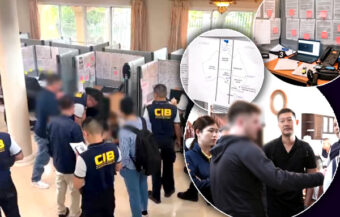Thailand faces worsening economic and political turmoil. The Constitutional Court’s dissolution of the Move Forward Party and the potential removal of PM Srettha Thavisin could lead to a crisis. Top economist Sompop Manarangsan warns of impacts on the economy.
The dissolution of the Move Forward Party by the Constitutional Court in Thailand made news on Wednesday worldwide. Certainly, it is not the sort of news the government needs to attract inward investment. Neither does it send a signal that Thailand is politically stable. Another, in the short term, even more momentous ruling, is due next Wednesday. The removal of Prime Minister Srettha Thavisin would see the government collapse. A political crisis would ensue. On Wednesday, one of the country’s leading economic thinkers, Mr. Sompop Manarangsan, said political instability is at the root of Thailand’s ailing economy, which for the last decade has only grown by half the ASEAN bloc and world average. In addition, Thailand is facing turmoil in the wider world economy and controversy over its Digital Wallet scheme.

One of Thailand’s top economic minds and President of one of the kingdom’s leading education institutes has warned the continuing instability is hurting the country’s economy.
Mr. Sompop Manarangsan was speaking on the same day after the Constitutional Court dissolved the Move Forward Party, sparking turmoil in Thai politics.
Furthermore, on August 14th, another momentous decision is due which could see the government leader of the present coalition removed from office.
Thailand faces an acute and extended political crisis if Prime Minister Srettha is removed next Wednesday
Certainly, if the latter occurs, because of the quirks of the inflexible and convoluted nature of the 2017 Constitution and other provisions inserted by the junta government from 2014 to 2019, the Kingdom will face an acute political crisis.
In short, the House of Representatives when choosing the next Prime Minister is limited to names submitted before the May 2023 General Election.
Furthermore, some of these are ill, are or will already be barred from holding office. For instance, Mr. Pita Limjaroenrat was barred from politics by the Constitutional Court on Wednesday for 10 years.
Certainly, the choice may boil down to either Paetongtarn Shinawatra or Ung Ing and Bhumjaithai Party leader Anutin Charnvirakul. Both are problematic.
Ms. Paetongtarn because of the controversy surrounding her father Mr. Thaksin and ingrained antagonism from a cross-section of the population, while Mr. Anutin’s party’s support in public opinion polls is only 2.2%.
Political turmoil coincides with global economic uncertainty as investment money seeks better returns
In addition, as Dr. Sompop noted on Wednesday, this period of political turbulence is striking at a time of economic turmoil worldwide.
Certainly, in the last week, there have been routs on world stock exchanges, in particular in Japan and the United States. The US economy is finally stalling. These developments directly affect Thailand on a range of fronts.
For a start, they will result in falling exports. The United States is Thailand’s largest and most profitable export market. Dr. Sompop, in addition, noted what is happening in Japan where a period of ultra-low interest rates is coming to an end.
This has implications for Thailand.
In a world where financial trading and money transfers are instantaneous, the differential in interest rates between the United States at 5.25% to 5.5% and countries like Japan and even Thailand with relatively lower interest rates has become a problem.
Japan’s shift and its impact on the world’s financial stability. Money is leaving Asia for higher rates
In short, Japan has started to experience inflation where normally deflation was the problem. Dr. Sompop noted that between them, the US and Japanese economies are one-third of the world’s GDP.
The deterioration of the value of the Yen has come about through a lack of confidence in the money market.
In summary, this was caused by Japanese policymakers suddenly lifting the borrowing rate to 0.25% from a long-term value of 0%. Indeed, they had been held at 0% for ten years.
The economic expert who once taught at Chulalongkorn University notes that money is flowing out of Japan and Asia.
“You borrow money in Japan at very low interest rates. When you get yen, you sell it to buy US dollars to invest in the US because it gives a higher return. So more money flows out of Japan, further weakening the yen, causing damage to imported goods, making them very expensive,” he explained.
US economic slowdown and its potential effects on the World. America is Thailand’s biggest export market
Dr. Sompop expressed concern about the US economy. In short, the recent employment data just released has spooked markets. Significantly, he noted that seven major or ‘angel’ companies in the United States such as Apple and Microsoft represent not less than half US GDP.
“When the financial sector has a lot of problems because the American economy is based on the financial sector and the service sector, it has clearly started to slow down. For example, the unemployment rate has increased from about 3% to 4.3% on July 1.”
“The rate of new employment has also declined significantly, which has caused problems for the United States because it has grown beyond its capacity in the past.
It has grown due to strange monetary policies, such as using very low interest rates and injecting a lot of money. In short, these situations have caused the global economy to lose its balance.”
Thai economy impacted due to reduced demand and tourism from developed countries as a slowdown bites
Basically, all this will impact Thailand both in terms of reduced export demand and tourism. If the US and Western economies slow down, then wealthier consumers will cut back both on goods purchased at the supermarket and overseas trips.
Furthermore, Dr. Sompop said the political instability was exacerbating the problems. Therefore, Thailand’s stock market has lost 15.32% since last year and 8.29% year to date.
Significantly, Dr. Sompop quickly identified the government’s flagship Digital Wallet policy as another source of concern. Certainly, at this time he agreed the scheme must be proceeded with. However, there are major concerns. Firstly, it is not clear how the scheme will operate.
For instance, Digital tokens will mean that smaller businesses will be parting with valuable stock but have no clear idea when or how they can convert digital tokens into cash. Certainly, it is clear, at this time, that it will not be cash the next day.
Digital Wallet concerns and potential economic repercussions. Not yet sure how it will work for retailers
Dr. Sompop spoke of the Digital Wallet being a ‘whirlwind’ as pro-government sources have suggested. However, he explains that what is needed is a self-sustaining storm.
Undeniably, the scheme will leave the country’s balance sheet in a weaker position.
Moreover, Dr. Sompop expressed concern that policy when unleashed will run into problems. Consequently, he feared that it may become a further source of division in society. In short, political enemies of the Pheu Thai Party may weaponize such problems to sow public anger.
Therefore, this theoretical plan to boost the economy could quickly have not only a limited or even negative economic effect, but it could also unleash further political instability.
“Thai politics are not stable right now because we are still stuck with the government’s main policies that we ourselves still can’t figure out, such as the digital wallet. It’s been a year and it’s still the same. We can’t not move forward because we’ve already campaigned with the people.”
Need for clear policies, long-term economic and political stability. Digital Wallet causes a loss of focus
In addition, Dr. Sompop says the emphasis on the controversial policy has caused the focus to be taken off other endeavours.
“Therefore, when we are in a hurry with this policy, it causes other policies to be reduced or development policies to be greatly reduced because we are busy with digital wallets and land bridges. As a result, in the past, the government has lost a lot of opportunities to develop and restore the economy in various aspects.”
Inward immigration may ultimately be the only thing that can halt Thailand’s fated economic decline
Pheu Thai MP warns lying critics of the Digital Wallet they may face prosecution after a fairly good start
The economic expert whose institute trains young professionals to work in the real economy identified two things Thailand needs. One is political stability in the long term, the other is greater efficiency.
Thailand needs a government that can set direction and implement policies for the longer term. At length, business leaders are looking for clarity and stability.
Thailand’s struggle with investment and growth compared to the ASEAN bloc. GDP growth less than half
Undoubtedly there is presently excess liquidity in the world. In addition, there is also some interest in Thailand. For instance, applications to the Board of Investment (BOI) are impressive.
However, Dr. Sompop was careful to distinguish between Board of Investment (BOI) investment pledges and actual investment. Real Foreign Direct Investment (FDI) is significantly lower. This is consistently the case.
In short, Thailand must walk the walk when it comes to stability. Inward investors are looking at the long term. So far, Thailand has been losing out on Foreign Direct Investment.
“Don’t forget that if foreigners come to invest, it will take at least 5-8 years for them to reach the break-even point. But when they see this, they probably won’t want to come in. Plus, they have other options to invest elsewhere. That’s why the Thai economy is in the state we see.”
Thailand has had slower economic growth compared to ASEAN peers and global averages for the last ten years
Dr. Sompop drew attention to the fact that in the first six months of this year, the ASEAN bloc had grown economically by 5%. In the meantime, Thailand will be lucky to have grown by 2%.
Indeed, last year ASEAN grew by 5%, Thailand by only 1.9%. Certainly, this pattern has been seen in the last ten years. Thailand’s growth is less than half that of the Southeast Asian bloc. Furthermore, with the world’s economy growing on average by 3-3.5%, Thailand is also half the world’s average.
Undoubtedly, something is wrong. The Bank of Thailand blames it on structural problems such as high household debt, an education deficiency, an ageing population, and, as this week has shown, political instability.
Join the Thai News forum, follow Thai Examiner on Facebook here
Receive all our stories as they come out on Telegram here
Follow Thai Examiner here
Further reading:
Inward immigration may ultimately be the only thing that can halt Thailand’s fated economic decline
Thailand’s days of GDP growth in excess of 5% may be a thing of the past as it has grown too old
Cabinet in pension move as the number of working Thais to over 60s is set to half in 20 years
Thailand’s new move to boost the birth rate and fight the negative impact of an ageing population
Denmark and Thailand seek economic partnership and face the same challenge – demographics
Thailand’s new move to boost the birth rate and fight the negative impact of an ageing population
BCG economic and social blueprint over the next 5 years unveiled, promises more money for less
Noble spirit of Thailand’s elderly helps country deal with demographic problem


















